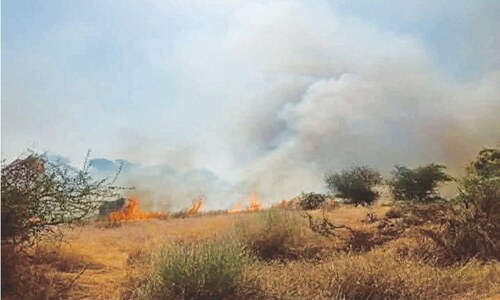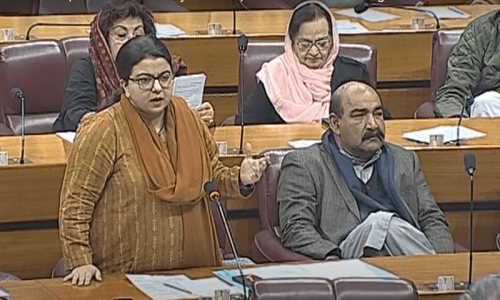This year, the IG Punjab received 10,253 complaints for the non-registration of FIRs; 1,283 complaints for the registration of false cases; 861 for seeking bribes.
Investigations must be based on circumstantial evidence corroborated by scientific methods of collection of evidence.
Law and arbitrary power are in eternal conflict, said Edmund Burke at the trial of Warren Hastings on Feb. 16, 1788. Fast forward to the 21st century, this dilemma still haunts Pakistan. In a polity increasingly contemptuous of law and careless of order, citizens will get the police force that they deserve. Pakistan has reached a stage where comprehensive justice sector reforms cannot be ignored by the state and society. Terrorism, insurgency and organised crime pose daunting challenges to the writ of the government. One of the key points of the National Action Plan was to reform the criminal justice system, including policing, prosecution services, the judiciary and prisons. Even after two years of expression of national resolve to combat terrorism effectively and professionally, the results reveal a mix of sporadic initiatives and attempts at capacity-building of civilian law-enforcement agencies. The resultant void is being filled with excessive reliance on civil armed forces, such as the Rangers in Karachi and the Frontier Corps in Balochistan. Military operations are a short-term remedy to recapture territorial spaces like Fata; and the security bubble must be consolidated with effective criminal justice processes and civilian governance institutions. Far-reaching reforms should be the main goal of all the state stakeholders wanting peace and order to be truly restored in the country.
The question is where to begin instituting reform. Undoubtedly, a starting point should be an institution which is the first point of contact with citizens seeking redress of their grievances as victims of crime, injury or insult. When citizens are insecure, they turn to institutions tasked by law to protect them — institutions that they trust. However, admittedly, the police have failed to inspire that confidence and as this paper has correctly pointed out editorially on December 1, “the image that prevails in Pakistan is of a corrupt, inefficient force that preys on the citizenry and is beholden to its political masters”. In other words, the police are perceived as a professionally inept, politicised, brutal and corrupt force. It is, therefore, crucial to reform this instrument of law and order if justice and security are to be achieved.
To begin with, it is imperative to address strategic issues and then focus on matters that deal with public concerns and complaints requiring the attention of the police leadership. Firstly, the police command and supervisory ranks are generally subjected to political interference and extraneous influences in their administrative and operational domains. It is only KP that has set a trend to depoliticise the police, not only through a legislative and administrative framework but a combination of strong police leadership and political will shown by the ruling coalition — the latter must be given credit for this initiative. Secondly, security of tenure of police chiefs as well as regional and district police officers is a crucial factor in planning and executing policies as well as ensuring their continuity. Credit must be given to the Punjab and KP governments for ensuring stability of tenures to their present police chiefs, both of whom have been able to initiate some meaningful reforms to address issues of public complaints as well as professional matters regarding training and capacity building.
Then, the issues of corruption, misuse of authority and highhandedness have not been dealt with through effective internal and external accountability mechanisms. The Punjab government’s decision this April to establish an independent police complaints authority as per the Police Order, 2002, has not been implemented. Good governance and accountability remain hollow slogans all over Pakistan. Coming to the major issues of public concern, here is the sample of complaints received in the office of the Inspector General of Punjab this year so far: 10,253 complaints for the non-registration of FIRs; 4,540 complaints for inefficiency/slackness in duty; 1,771 cases for faulty investigations; 1,283 complaints for the registration of false cases; 861 for seeking bribes; 269 complaints for arresting innocent persons; 153 complaints for illegal detentions; and a large number of 5,333 other miscellaneous complaints that have not been categorised. Apart from a surprisingly small number of grievances pertaining to graft against public perception, these tabulated public complaints are reflective of the malaise afflicting the police system that must be addressed with vigour by police commanders to regain public trust. Therefore, the agenda and priorities for police reforms are suggested as follows.
One, the police must respond immediately when citizen’s call in distress. The so-called Dolphins (in Punjab) and rapid response squads should be minutes away to rush to help those in need. Two, free registration of cases must be given the highest priority. Citizen’s complaints should be recorded — whether received telephonically or reported personally. Non-registration of cases is a significant complaint in respect of offences against property, especially thefts and robberies. False case registration involves crimes against persons where people resort to misuse of police or bribe them to settle their personal scores. This is where deterrent punishments are called for against wrongful arrests by the police and legal action against false complainants. Supervisory officers must ensure that no arrests happen without sufficient evidence. This single safeguard against a culture of lies will enhance the image of the police tremendously. For this to happen investigating officers must be chosen carefully, preferably constitute a separate cadre of thorough professionals.
Three, instead of placing reliance on ocular testimony and resort to fake witnesses, investigations should primarily be based on circumstantial evidence corroborated by scientific methods of collection of evidence. Massive retraining is called for to change the culture of investigations that is mostly based on a planned conspiracy through recording doctored FIRs. Police officers do not determine guilt or innocence; they should confine themselves to collecting evidence and placing it before a court of law. Four, no illegal detentions, torture, false arrests and fake ‘encounters’ must be tacitly encouraged. These tarnish the institution’s prestige because the police are not supposed to act as executioners and judges. Sir John Moore’s prescription, that humanity produces better soldiers than harshness, applies to police even more as they are an instrument of justice that must be humane, firm and impartial. Five, police corruption must be curbed with an iron hand. There is an argument that you cannot have an island of integrity in an ocean of corruption. But this cannot be a justification for police corruption; theirs is a leadership role. The police execute a public office under the law, and it is the law that reigns supreme.
Robert Peel, the founder of modern policing when looking for the first-ever police commissioner in Britain in 1829, sought the qualities of “great energy, great activity both of body and mind, accustomed to strict discipline and the power of enforcing it.” For reforms within, the present police command must come close to this image of leadership so direly needed. And finally, the police as an institution can only survive through public consent, by the temperate use of its considerable powers and by its ability to walk the hazardous tightrope of public opinion.
(The writer is a former IG Police.)
Published in Dawn December 19th, 2016














































